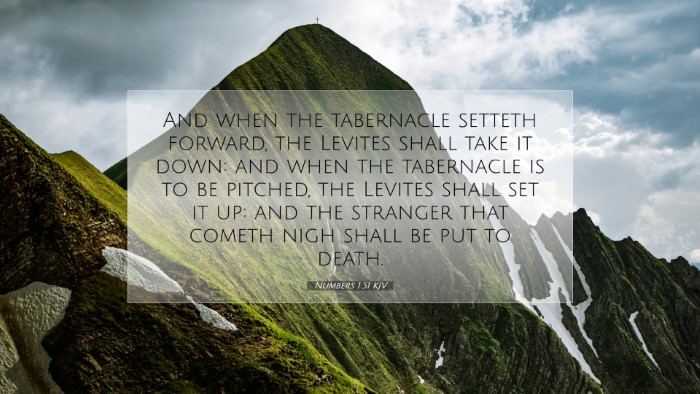Commentary on Numbers 1:51
Verse: "And when the tabernacle setteth forward, the Levites shall take it down: and when the tabernacle is to be pitched, the Levites shall set it up: and the stranger that cometh nigh shall be put to death."
Introduction
The Book of Numbers, a crucial part of the Pentateuch, deals with the organization and preparation of the Israelite community for their journey through the wilderness. Numbers 1:51 specifically addresses the responsibilities of the Levites concerning the transportation and assembly of the Tabernacle, the center of worship, underscoring their unique role among the tribes of Israel.
Historical Context
The Israelites, wandering in the desert after the Exodus from Egypt, required a systematic approach to their journey. The tabernacle served not only as a place of worship but also as a symbol of God’s presence among His people. The Levites, descended from Levi, were set apart by God for temple service and had specific duties tied to the tabernacle.
Commentary Insights
Matthew Henry's Commentary
Matthew Henry emphasizes the sacred responsibility of the Levites: "They were appointed to take down the tabernacle when the camp removed, and to carry it; and when the camp settled, they were to re-erect it." This special duty highlights their role in facilitating worship and maintaining the sanctity of the holy place. Henry also notes that this division of labor reflects God's order within the community, which was essential for coherence as they journeyed through the wilderness.
Albert Barnes' Notes
Albert Barnes elaborates on the significance of the Levites' responsibility: "The Levites were to protect the holy items and ensure that they were handled only by those authorized." Barnes points out that this not only kept the community safe but also underscored the holiness of the Tabernacle. The severe consequence mentioned—the death of a stranger who approached—demonstrates the seriousness with which God regarded His sacred space. Barnes stresses that boundaries were essential for maintaining holiness and preventing defilement.
Adam Clarke's Commentary
Adam Clarke points out that the term "stranger" refers to anyone not belonging to the Levitical tribe who approached the tabernacle in an unauthorized manner. He writes, "This law was given to preserve the sanctity and sanctity of God's dwelling among His people." Clarke further explains that this harsh directive reveals God's holiness and the importance of approaching Him with reverence and respect. It serves as a sobering reminder of the gravity of sin, which cannot stand in the presence of the holy God.
Theological Implications
The duties assigned to the Levites in Numbers 1:51 give rise to important theological considerations.
- The Holiness of God: The Bible consistently affirms that God is holy and cannot be approached lightly. The deaths mentioned attest to the seriousness of maintaining barriers that safeguard holiness.
- The Role of Mediators: The Levites served as mediators between God and the people, reflecting the ultimate mediation fulfilled in Christ. Jesus, the greater High Priest, provides access to God, highlighting the need for reverence and acknowledgment of His holiness.
- The Order of Worship: The structured nature of worship in the Old Testament provided a blueprint for Christians today. It teaches the importance of proper conduct and the acknowledgment of God's authority in our worship practices.
Application for Pastors and Scholars
This verse serves as a powerful encouragement for pastors and church leaders in their responsibilities toward worship. It calls for an understanding of the gravity with which we must treat God's presence in the church today. As Levites, leaders must uphold the holiness of God and guide others in appropriate worship practices.
For students and theologians, Numbers 1:51 offers fertile ground for exploring themes of holiness, authority, and community order. Engaging deeply with these themes can lead to enriched understanding of God’s character and His expectations of His people throughout both the Old and New Testaments.
Conclusion
Numbers 1:51 not only outlines the Levites' duties but also serves as a profound reminder of God's holiness, the structure of worship, and the serious implications of approaching Him. By combining insights from prominent theologians, we gain a deeper understanding of these mechanisms at play in Israel's journey and their relevance in our spiritual lives today.


